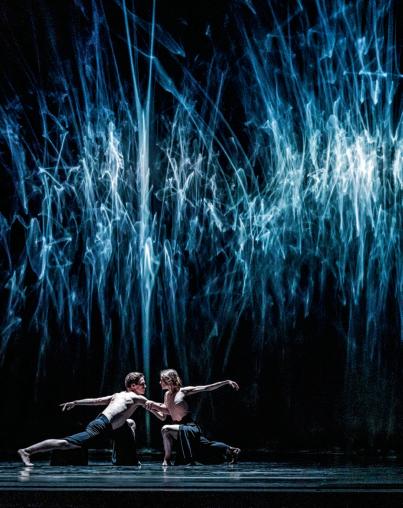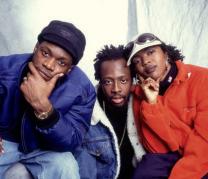
6 minute read
Agenda
5
[ L E T ’ S D A N C E ] Welcome prima ballerinas back to the stage
Advertisement
ONCE the National Ballet of Canada shut its doors in March 2020, principal dancer Heather Ogden tried to make her work from home work a little harder. She and her husband, dancer/choreographer Guillaume Côté, each picked up a square of the vinyl flooring they were used to practising on. They cleared a spot in their bedroom for a ballet barre they bought online. They made ridiculously cute videos dancing with (and around) their kids, aged 4 and 6. Still, by the summer, Ogden was so itchy to perform that she found herself on a gravel road in shorts and Keds, starring in the film Lulu for the company’s virtual season. “I remember dropping to my knees in the gravel and thinking, ‘This is going to hurt,’” she says. “But, honestly, I think it shows my dedication and my desperation to dance.”
Now, after 20 months away and a variety of protocols to get dancers safely back into the studio—at one point, they were practising in four-person pods under a sign that read “Get in. Dance. Get out.”—the National Ballet is returning to the stage. “I’m so excited for that togetherness with the company and the audience,” Ogden says. “The performance is when you feel most like an artist.” It feels fitting that the first show back will be Canadian
Dancers Harrison James and Heather Ogden in the National Ballet of Canada’s Angels’ Atlas.
choreographer Crystal Pite’s Angels’ Atlas, a mesmerizing work that depicts the unpredictability and impermanence of human life—and that happened to premiere in Toronto days before lockdown. “It’s always nice to come back to a ballet, and this piece is so meaningful and spiritual,” Ogden says. “I think it’ll be emotional to be back on stage, but I so look forward to it.” — DANIELLE GROEN
Angels’ Atlas runs at the National Ballet of Canada from Nov. 11 to 27.
[ M E M O R Y L A N E ] Kick it old school
At a time when the future seems so uncertain, it’s no surprise we want to indulge in a bit of nostalgia. Thankfully, pop culture came through this season, offering up some primo blasts from the past.
6
Throw it back to: 2313
Dexter: New Blood brings back the Robin Hood of serial killers (Michael C. Hall), who continues his vigilante pursuit of (other, evil) criminals in a world where murder podcasts now reign supreme. Premieres Nov. 7 on Showtime.
Throw it back to: 1636
In the four centuries since a witchy prophecy first sent power-hungry Macbeth and his guiltwracked wife spiralling into madness on the British stage, superstitious theatre types have viewed Shakespeare’s so-called Scottish Play as a cursed production. But Joel Coen’s The Tragedy of Macbeth feels like nothing short of a blessing, with Denzel Washington and Frances McDormand turning in spellbinding performances. Dec. 25. — SARAH LISS
Throw it back to: 1996
Blink and you’d think it was the mid-’90s all over again: barrel-leg jeans and scrunchies are back in style, and the Fugees are hitting the road. Even if you miss the trio live, fire up their sophomore album, The Score—it may be 25 years old, but its fusion of reggae-laced hip-hop, R&B and pop sounds as fresh as ever. Tour kicks off Nov. 2 in Chicago.

7
[ G I F T S H O P ] TREAT THE CULTURE LOVER IN YOUR LIFE

Blame It on the Juice: Lizzo 1,000-piece puzzle
Perfect for anyone feeling
“Good as Hell,” this vibrant puzzle is a piece of art, much like Lizzo herself, and includes references to the singer’s iconic repertoire: her ’80s aerobics look from “Juice,” the pink cowboy hat from “Tempo” and, of course, her show-stealing instrument, Sasha Flute. $30, thepuzzlenerds.com.
Chinatown Pretty
Searching for a little fashion inspo? Look to your elders! That’s what photographer Andria Lo and writer Valerie Luu have done, capturing the street style and wisdom of fashionable seniors across six Chinatowns in North America, including Vancouver’s. $36, typebooks.ca.
Custom Spotify code key chain No, mixtapes aren’t a thing of the past—they’ve just caught up to the 21st century. Choose a song or album (or create a playlist) that’s significant to you and your giftee. The QR code for the music is etched on a wooden key chain, ready to scan through the Spotify app. You can also add a custom message on the back. $17, etsy.com/ca/shop/WhiskeyRoseStudio. — IZZY DOCTO
8
[ S T O R Y B O A R D ]
Curl up with a divine new book
It took SJ Sindu five years to finish the first full draft of her gripping new novel, Blue-Skinned Gods, about a blue-skinned boy who is worshipped as a living god but begins to doubt his own divinity. We spoke with the Toronto-based Sindu about her influences, how gods deal with gender and her favourite writing teacup
Written by S. BEAR BERGMAN
What inspired this story?
I saw this documentary called Kumaré by the filmmaker Vikram Gandhi, who pretends to be a guru, amasses a huge following and . . . is just making stuff up: making up yoga moves, making up meditations. At the end of the documentary, he tells his followers, “I don’t even have this accent. This is complete fraud.” The reactions are fascinating—some of them felt completely betrayed, but some decided, “I still think you’re a guru. I still believe in you.” That’s when I started the book that became BlueSkinned Gods.
What do you need to start writing on a given day?
Tea. Usually an orange pekoe from the Darjeeling region, which has a minerality that I like. I’ve come to associate it with writing, so—on my writing days—I absolutely have Darjeeling tea. Then I pick a teacup from my collection; my favourite writing teacup has mint polka dots, with roses on the inside. I also have teaching teacups, and one I only use on my birthday.
Did you listen to any music while you wrote?
No. I can’t multi-task. Not at all. Even if I’m having a conversation and somebody hugs me, I stop talking because I’m receiving a hug.
Were there books you returned to often?
I read Vivek Shraya’s work while I was writing this novel— sp e ci f ic a l ly, I’m Afraid of Men and She of the Mountains. I kept going back to those two books, because I felt like they capt u red somet h ing about both salvation mythology and gender fluidity. Kalki, my main character, is nonbinary and feels himself as somewhere between god and human. That’s his concern, figuring out that part. I don’t know what it’s like to be worshipped as a god, but my experiences—how I relate to my gender, how I relate to my sexuality—really informed my understanding of that process, and Shraya’s work is all about that.
What did you do when you got stuck while writing?
I lived in Florida then, and I would go to the beach. I would get into the water, into the ocean, and it instantly calmed me. Just thinking in the ocean, moving the water around with my body, really helped. Every single time I got stuck, I did that, and I would stay in until I had the answer I was seeking. It worked every time. BlueSkinned Gods is out now.










